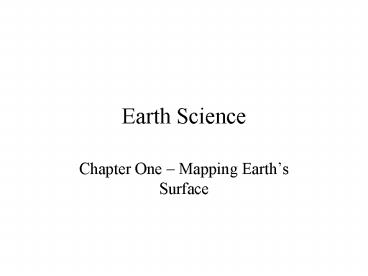Earth Science - PowerPoint PPT Presentation
1 / 30
Title:
Earth Science
Description:
Earth Science Chapter One Mapping Earth s Surface – PowerPoint PPT presentation
Number of Views:384
Avg rating:3.0/5.0
Title: Earth Science
1
Earth Science
- Chapter One Mapping Earths Surface
2
Section One Exploring Earths Surface
- Topography is the shape of the land. An areas
topography may be mountainous, flat, sloping, or
hilly. Topography is determined by elevation,
relief, and landform. - Landforms this is the shape of Earths surface.
All landforms have elevation and relief.
3
Landforms
- There are three main types of landforms
- Plains a landform made up of flat or gently
rolling land with low relief. A plain that lies
along a seacoast is called a coastal plain, with
low elevation and a plain away from the coast
is called an interior plain with both high or low
elevations. - Mountains is a landform with high elevation and
high relief. Mountains usually occur in a group
called mountain ranges. - Plateau a landform that has high elevation and
a more or less level surface. Streams and rivers
usually cut into the plateaus surface this is
why the surface is not smooth.
4
Plains, Mountains, and Plateaus
5
Landforms
6
Rocky Mountains
7
Canyons
- The Grand Canyon
8
Sand Dunes
9
Volcanoes
10
Examples of Landforms
- http//www.enchantedlearning.com/geography/landfor
ms/glossary.shtml
11
Relief Map of New Jersey
12
Four Spheres
- Scientists divide Earth into four spheres
- Lithosphere LithoLand Earths solid, rocky
outer layer. The lithosphere is made of the
continents as well as smaller landmasses called
island. The lithosphere included the entire
ocean floor. - Atmosphere the outermost sphere, which includes
a mixture of gases that surrounds the planet. - Hydrosphere Hydrowater this includes Earths
lakes, rivers, oceans, and ice. - Biosphere Bioliving All living things in the
air, oceans, or on and beneath land.
13
Animation of Spheres
- http//www.classzone.com/books/earth_science/terc/
content/visualizations/es0102/es0102page01.cfm?cha
pter_no01
14
Earths Three Layers
- Earth is made up of three layers.
- The core is the center of the Earth. There is
the inner core and the outer core. - The mantle is the thick layer that surrounds the
core. - The Crust is the thin, outer layer made of rock.
15
Diagram of the Earths Layers
16
Section Two Mapping Earths Surface
- A map is a model on a flat surface of all or part
of Earths surface seen from above. - A globe is a sphere that represents Earths
entire surface. - Symbols are used on a map with an explanation of
their meaning symbols represent topography and
other features on Earths surface. The map key
lists all the symbols used on the map.
17
Map
18
Globe
19
Using a Map or Globe
- Maps and globes show a grid based on two
imaginary lines. Half way between the North and
South poles is the equator. The equator divides
Earth into the Northern Hemisphere and the
Southern Hemisphere. - The second imaginary line is the prime meridian
this line makes a half circle from the North Pole
to the South Pole dividing the Earths surface
into the Western Hemisphere and the Eastern
Hemisphere. - We live in the North-Eastern Hemisphere.
20
Equator
21
Prime Meridian
22
Latitude/Longitude
- The equator is the starting point for measuring
latitude the distance in degrees north and
south of the equator. - The distance in degrees east or west of the prime
meridian is called longitude.
23
Map with longitude/latitude
- Latitude Longitude
24
Longitude/Latitude
25
Section Three Maps in the Computer Age
- Satellites are designed to observe Earths
surface. Satellites use electronic devices to
collect information about the land surface in the
form of computer data Satellite images are
pictures of the surface based on these data. - A Satellite image is made up of thousands of
tiny dots called pixels.
26
Satellites
- Image taken by a satellite in space
27
This image consists of 196 separate photographs
taken with a 6 megapixel digital camera, and then
stitched together into one seamless composite.
The final image is 40,784 x 26,800 pixels in
size, and contains about 1.09 billion pixels
28
Section Four Topographic Maps
- A topographic map is a map showing the surface
features of an area. - To represent elevation, relief, and slope on
topographic maps, mapmakers use contour lines. - Closely spaced lines indicate a steep slope.
- Widely spaced lines indicate gentle slopes.
- A contour line that forms a closed loop with not
other contour lines inside it indicates a hill. - A closed loop with dashes inside indicates a
depression. - V-shaped contour lines pointing uphill indicate a
valley.
29
Topographic Map
30
Examples of Contour Lines

